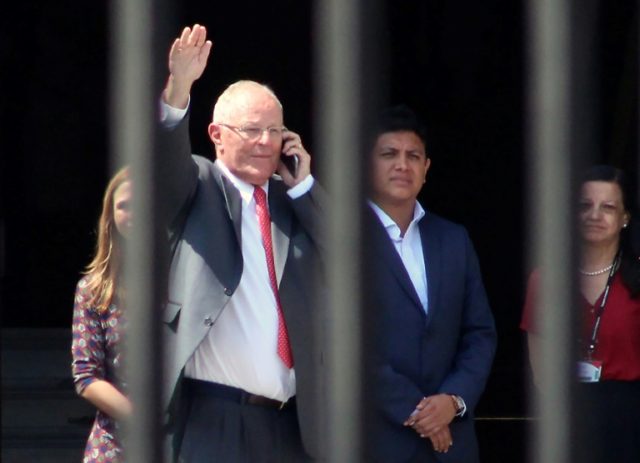Peruvian courts are weighing whether to prevent Pedro Pablo Kuczynski, who resigned as president on Wednesday, from leaving the country following multiple allegations of corruption, including one linking him to the disgraced Brazilian firm Odebrecht.
Kuczynski tendered a resignation letter on Wednesday, lamenting what he claimed to be crippling partisanship in Lima that made his job impossible. He resigned a day after the opposition Popular Force party released videos purporting to show Kuczynski’s attorney attempting to bribe politicians into voting against his own impeachment.
Among the congressmen implicated on video was Kenji Fujimori, the brother of conservative Popular Force party leader Keiko Fujimori. Their father, Alberto Fujimori, was president of Peru for a decade in the 1990s and himself received a 25-year prison sentence for corruption. Kuczynski pardoned the elder Fujimori, 79, on humanitarian grounds.
Kuczynski will remain president until Congress accepts his resignation. Popular Force controls the Congress and may seek to reject the resignation and pursue impeachment, anyway, which would require extensive proceedings into the corruption allegations against the president. Congress was scheduled to vote on impeachment for a second time on Thursday, before Kuczynski resigned. Now, they are scheduled to vote on whether to accept the resignation.
Kuczynski served one year and seven months as president of Peru.
On Wednesday evening, the head of the investigative team leading probes into Odebrecht’s corruption in Peru requested that judges ban Kuczynski from leaving the country if Congress accepts his resignation. To keep Kuczynski grounded, El Comercio reports, the court would have to name him as an official target of the investigation into Odebrecht, known throughout Latin America as “Operation Car Wash.” The basis for such a decision would be evidence that Odebrecht paid a firm controlled by Kuczynski, Westfield Capital, over $3 million in “consulting” fees between 2004 and 2007. At the time of these payments, Kuczynski was serving as the nation’s Economics Minister.
If Congress does not accept the president’s resignation, they will continue impeachment proceedings directly related to the Odebrecht case, likely rendering unnecessary a court ban on international travel. Under Peruvian law, a president may be impeached for “moral unfitness,” which opposition politicians cited during their first attempt at impeaching Kuczynski.
Peruvian media began reporting mid-afternoon Wednesday that Kuczynski would resign to avoid the impeachment vote. Later that day, Kuczynski posted his resignation letter on Twitter:
He remitido al Congreso el original de esta carta, que he transmitido al Perú, renunciando al cargo de Presidente Constitucional de la República. pic.twitter.com/PHX6ZccU9r
— PedroPablo Kuczynski (@ppkamigo) March 21, 2018
In the letter, Kuczynski decries the “constant obstructionism and attacks that I have been subjected to on the part of the legislative majority since the first day of my government.”
“This political confrontation has created a climate of ungovernability that does tremendous harm to the nation and does not allow us to advance,” he continues, citing the “edited and selectively tendencious recording” of his attorney meeting with Kenji Fujimori, which he claims only gives “the impression that the government was offering aid for works in exchange for votes in favor of the Congressmen who voted their conscience.”
“It is best for the country that I resign from the presidency of the republic because I do not want to be stumbling block on the way for our country to reach the unity and harmony that it so needs and that was denied to me,” he concludes.
The corruption alleged in the videos surfacing is independent from the Odebrecht case. In the videos, Kenji Fujimori appears to accept bribes in the form of support from the presidency for his local pet projects in exchange for voting against impeaching Kuczynski and rallying opposition politicians against impeachment. The video was reportedly recorded in December, when Fujimori was still a member of his sister’s Popular Force party.
Fujimori resigned from Popular Force in early March, writing on Twitter, “I have no doubts about my sister, but the party has no moral authority anymore.”
Con mucha tristeza, tengo el deber de renunciar al Partido Fuerza Popular. El sacrificio de tantas personas por el fujimorismo en todo el Perú, hoy se ve empañado por unos pocos. No dudo de mi hermana, pero el partido ya no tiene autoridad moral. El amanecer,sin embargo, llegará. pic.twitter.com/sJUlVpJNfw
— Kenji Fujimori (@KenjiFujimoriH) March 1, 2018
Following the release of the videos, which Peruvian media have been referring to as both the “Kenjivideos” and the “Keikovideos,” Congressional President Luis Galarreta announced it would begin proceedings to remove Kenji Fujimori and the other legislators implicated in the videos from power.
Vice President Martín Vizcarra Cornejo is expected to swear in as president of Peru on Friday.
A national poll taken last week found that about half of Peruvians would like to vote in a new presidential election as soon as possible.
Kuczynski won the presidency in 2016 with 50.12 percent of the vote in a second round run-off against Keiko Fujimori. Fujimori won the first round of elections, which included other candidates, by a significant margin, but not the necessary 50 percent to avoid a run-off.

COMMENTS
Please let us know if you're having issues with commenting.